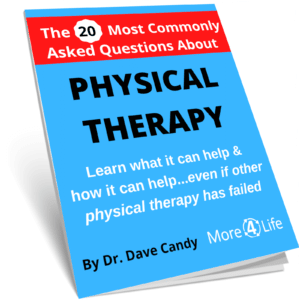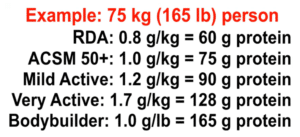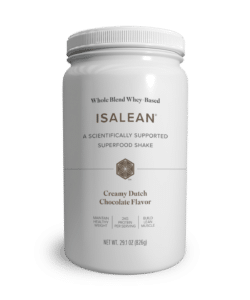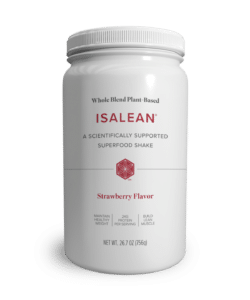One of the biggest concerns I see among people over the age of 50 is building and/or maintaining muscle so that they can stay active and independent as they age.
Most of the time when they come to see me for physical therapy, they're looking for exercises to help them get stronger. However, all of the strengthening exercises in the world won't make a difference if you're not eating enough protein.
Watch the video earn how much protein you need over 50 to build muscle and prevent muscle loss.

The #1 Nutrition Mistake That Keep People Age 50+ From Building Muscle
All of the strengthening exercises in the world won't make you stronger if you're not backing it up with proper nutrition.
All aspects of nutrition are important for maintaining general health, a healthy weight, and increasing or maintaining muscle mass.
But one of the biggest mistakes I see people make is not getting enough protein.
There are several reasons why people may not get enough protein as they age.
For example, when cooking for a family, people tend to make a large meal. But as the kids move out or if they become widowed or live alone, they may not have the desire to make a big meal just for themselves or themselves and a spouse.
Additionally, as people age, they start to lose their sense of smell, which affects their taste for food. When food doesn't taste as good, they don't have as much desire to eat.
Furthermore, as they become less active, their energy requirement decreases, which means they may not consume as much food in general.
When caloric intake decreases, people tend to decrease their intake of carbohydrates, fat, and protein proportionally.
This reduction in overall food intake leads to a decrease in protein intake as well.
Interestingly, even though people are less active and require less caloric intake, they actually need more protein as they age.
How Much Protein Do You Need Over 50?
The American College of Sports Medicine recommends a slight increase in protein intake after the age of 50 in order to maintain muscle mass.
Looking at the normal recommended daily allowance for protein intake for the general population, it's:
0.8 grams of protein per kilogram of bodyweight
or
0.35 grams of protein per pound of bodyweight.
However, the American College of Sports Medicine (ACSM) suggests increasing protein intake to one gram per kilogram of body weight for individuals over the age of 50.
If you participate in physical activities like cycling or weightlifting, the protein intake recommendation goes even higher.
How Much Protein Does An Active Adult Over 50 Need Per Day?
If you're an active adult, you may need to increase your protein intake. The ACSM recommendations are:
1.2 - 1.7 g protein / kilogram bodyweight
or
0.5 - 0.8 g protein / pound bodyweight
The more active you are, especially if you perform high-intensity exercise or weight lifting, the more protein you need.
How Much Protein Do You Need To Build Muscle?
For most people, the high end of the spectrum above around 1.7 g / kg or 0.8 g / lb may be sufficient.
Most bodybuilding resources recommend 1 gram of protein per pound of bodyweight.
That's not necessarily backed by randomized controlled trials, but that's a standard that has worked for bodybuilders for years.
Most people over 50 aren't trying to build as much muscle as a bodybuilder.
However, this just goes to show you that people who have been building a lot of muscle for a long time eat significantly higher amounts of protein than the recommended daily allowance.
And largely, you can do so safely if you don't have kidney problems.
Definitely check with your doctor if you're planning on significantly increasing your protein intake, particularly if you do have kidney problems.
But most people need a significantly higher amount of protein than the recommended daily allowance in order to build muscle.
How Much Protein Do You Need When Recovering From An Injury?
Additionally, if you're recovering from an injury and you're trying to rebuild tissues - for example, ligaments, tendons, or muscles - all of those require an increased protein requirement as well.
Protein is the "brick and mortar" of your body
I always tell people that if you think about building a house, your carbohydrates are like your workforce; they give you the energy to build an repair your body tissues as well as to do your daily activities.
But protein is the brick.
It's the stuff that the house (your body) is actually built out of.
You can have a lot of workers show up to the job site, but if they don't have any bricks to lay down, then the house isn't going to get built, no matter how many workers show up.
So it's important that you get enough protein in your diet, particularly if you're recovering from an injury.
Remember, the Recommended Daily Allowances were established for people to maintain body tissues.
But if you need to not only maintain, but rebuild, then you're going to need a little extra.
That probably falls somewhere in the 1.2 - 1.7 g / kg range, especially if you're doing physical therapy exercises focusing on building strength.
How Do You Get More Protein In Your Diet?
The most obvious protein source is animal products.
For example, meat, fish, eggs, and dairy.
Those are all complete proteins. They have all the essential amino acids and the proper proportions that your body needs to use them.
You can also get protein from peas, beans, grains, nuts, and seeds.
Those all have proteins, but they don't necessarily have the complete complement of amino acids in the right proportions as animal products do.
So, if you're a vegetarian, and especially if you're vegan, you need to be really careful about making sure you're mixing and matching your protein sources.
It's not just about the overall amount of protein but also making sure that you're getting a good the right proportion of amino acids that you need to use that protein properly in your body.
How Do I Know How Much Protein Is In My Food?
If you're looking at animal products, for example, meat, a general rule of thumb is that a four-ounce raw serving of meat is somewhere around 25 grams of protein.
And so, to use a simple, easy rule of thumb, one pound of meat has roughly 100 grams of protein.
For other protein sources, reading nutrition labels is the best way to determine the protein content of your food.
How Do I Know How Much Protein I Need?
It's a matter of doing some simple math. Just grab a calculator (or use the one on your phone), and plug in the numbers from above.
You'll have to determint your bodyweight, as well as your activity level.
Example protein requirement calculation:
For example, if you weigh 75 kilograms (165 lbs), if you look at just the recommended daily allowance of 0.8 grams per kilogram, the absolute minimum that you need to avoid deficiency, that's about 60 grams of protein per day.
I see a lot of people that don't even get that much through their diet as they age.
Now, that's not a ton.
If you are eating eight ounces of meat or an eight-ounce steak, you're gonna get fairly close to that (~50 grams) in just one meal.
But if you have decreased your appetite and you're not eating quite as much, it's very possible that you can get below even that amount.
Now, if you look at one gram per kilogram, the American College of Sports Medicine recommendations for someone who's over the age of 50, that increases to 75 grams for a 165 pound (75 kilogram) individual.
If you further increase that to the bodybuilding standard of one gram per pound of body weight (if you're extremely active and looking to build muscle), you're looking at about 165 grams of protein.
So, for someone who weighs 165 pounds (75 kg), is over the age of 50, and is somewhat active, they'll likely need between 75 grams and 165 grams of protein per day.
What If I Can't Eat That Much Protein?
If you don't think you can handle eating a pound or more of meat daily, you have a few options:
- add eggs to your breakfast
- increase your dairy intake (if you don't have allergies)
- use protein supplements
Be cautious when choosing supplements since the industry is largely unregulated.
The cheapest products may not offer high-quality protein.
However, you don't necessarily need the most expensive ones either.
Here's the protein supplement that I use personally 2-3 time per day.
It may or may not be the best one for you, but it's one that I've been using daily for over 5 years.
Vegetarians have options too, such as soy, but be mindful of soy consumption if you have a family history of breast cancer.
While moderate soy consumption is safe, high amounts of soy isoflavins from soy protein supplements could potentially increase your cancer risk.
Other vegetarian sources like pea protein and brown rice protein are common in non-dairy protein products.
Conclusion
I hope you found this helpful to understand your protein requirements and ensure your that your efforts in the gym, at home, or in physical therapy aren't in vain.
Again, consult your doctor if you're going to significantly increase your protein intake, particularly if you have kidney problems, as higher protein intake increases nitrogen output through your kidneys.
And if you need help from the exercise side of maintaining muscle, getting stronger, or recovering from an injury, tap the button below to request and appointment, and we' be happy to help you.
Here are some other posts about balance and fall prevention you might enjoy:
How To Get Up From The Floor After A Fall
3 Best Balance Exercises For Seniors To Improve Balance At Home
Spinal Stenosis and Balance Problems: 3 Ways To Improve Your Balance






